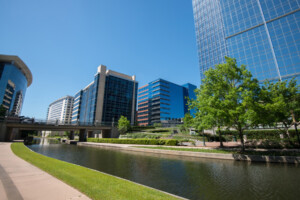Texas has become one of the top destinations for attorneys considering a move, whether for lifestyle reasons, family, or a shift in career focus. With no state income tax, a growing population, and a diverse economy, the Lone Star State offers strong opportunities across multiple legal markets. However, Texas is not a one-size-fits-all state. From energy law in Houston to tech-driven practices in Austin, each major metro has its own legal culture, client base, and pace of life. Understanding the unique strengths of each city can help you make a smarter, more strategic move based on your personal and professional goals.
Choosing the right city starts with knowing what you want from your next role and your day-to-day life. Are you focused on BigLaw? Interested in working with startups? Looking for courtroom experience or a better work-life balance? Your answers can help point you toward the legal market that best fits your goals. While cities throughout Texas offer vibrant legal communities, the differences between them can be significant. This guide will help you weigh the options by highlighting what makes each city stand out, so you can find the environment that suits both your practice and your lifestyle.
Dallas: Big Law Meets Big Business
Dallas ranks as the ninth-largest U.S. city and anchors the second-largest legal market in Texas. Its legal landscape is rich with opportunities in corporate law, M&A, tax, and financial services. From 2019 to 2024, Am Law 100 firms saw partner headcount in Dallas grow 91% in M&A and 56% in tax, with an average partner growth of 48%.
Major corporate users include 11 Fortune 500 headquarters within Dallas proper and 23 across the DFW metroplex. Dallas County supports over 17,600 active attorneys as of 2024, reflecting a 10% increase over the past decade. Legal talent continues to follow population growth, with the DFW metro recently adding 178,000 residents to reach 8.34 million.

Local culture and living options are equally appealing. Dallas offers a vibrant downtown arts district, numerous parks, and a major convention scene. The cost of living is about 7% higher than the state average and 2% higher than the national average, but still moderate compared with other major legal hubs. The city also has excellent flight connections, professional sports teams, and a wide range of housing options. Legal professionals can expect a robust BigLaw ecosystem alongside strong boutique and in-house opportunities.
Discover which Texas city aligns with your career ambitions.
Austin: Where Tech and Policy Converge
Austin’s legal market is fueled by a fast-growing tech economy, active state government, and a highly educated workforce. The city is home to two Fortune 500 companies and three Fortune 1000 companies, creating steady demand for legal services in corporate governance, compliance, and commercial transactions. Its booming tech sector continues to drive legal hiring in areas such as intellectual property, data privacy, employment law, and startup financing. For attorneys interested in advising emerging companies or navigating complex regulatory frameworks, Austin offers a strong and expanding platform.

As the capital of Texas, Austin also supports a high volume of legal work related to public policy, administrative law, and election law. Its status as both a government and innovation hub makes it a unique environment for lawyers who want to work at the intersection of business and regulation.
Austin is currently the 13th-most populous city in the United States and the fifth-most populous in Texas. The city’s cultural appeal and quality of life continue to attract new residents, with a strong local identity built around music, food, and outdoor recreation. The cost of living in Austin is about 3% higher than the state average and 3% lower than the national average.
Rising housing costs have led many professionals to settle in nearby suburbs such as Pflugerville, Round Rock, and Buda, which offer more space while still keeping commutes manageable. For attorneys seeking an energetic, tech-forward legal market, Austin presents a compelling mix of career potential and lifestyle perks.
Houston: The Energy Law Capital
Houston ranks as the fourth-largest city in the United States and serves as the largest legal market in Texas. Its size, economic diversity, and strategic global connections have made it a hub for both national and international law firms. Approximately half of the Am Law 100 firms have offices in Houston, and 14 of the 15 highest-grossing law firms by revenue maintain a presence here. This concentration of major firms reflects Houston’s significance not only within Texas but across the national legal landscape. The city’s legal market supports a wide range of practice areas, including commercial litigation, corporate law, and complex regulatory matters.

Known as the “Energy Capital of the World,” Houston’s legal sector is deeply tied to the oil, gas, and renewables industries. Many major energy companies have regional and global headquarters in the city, fueling consistent demand for attorneys who specialize in transactional, regulatory, environmental, and litigation work. As the energy landscape evolves, Houston remains at the forefront of legal developments in natural resources law. From advising on cross-border infrastructure deals to navigating environmental compliance and enforcement, legal professionals in Houston have access to some of the most sophisticated and high-value work in the country.
Houston has also seen high-profile disputes in recent years, including major energy infrastructure litigation and environmental compliance cases. The city continues to attract national firms expanding their energy practices, and several Am Law 100 firms have significantly grown their Houston offices in response to client demand.
In addition to energy, Houston supports thriving legal sectors in healthcare, construction, shipping, and finance. It ranks third among U.S. metro areas for the number of Fortune 500 headquarters, reinforcing its role as a center for corporate counsel and complex commercial work. Local courts also see high volumes of product liability and personal injury litigation, particularly in Harris County.
Lifestyle is another key advantage. Houston offers a diverse, multicultural community, strong public and private school options, and a cost of living that is approximately 6% lower than the national average. Housing is more affordable than in other major legal markets, and neighborhoods offer a range of options from urban high-rises to suburban communities. With a mix of professional opportunity and livability, Houston remains one of the most well-rounded legal markets in the country.
San Antonio: Growth in Family and Civil Law
San Antonio’s fast-rising population, now more than 1.52 million, is translating directly into heavier court dockets and a steady stream of new legal work. Family‐law filings remain robust thanks in part to the city’s large military community and its status as host of the Texas Advanced Family Law Conference, the world’s largest annual gathering focused on divorce and custody practice.

At the same time, civil litigators see growing opportunity in personal-injury, construction-defect, and consumer cases: Bexar County judges report backlogs topping 2,500 family-violence matters and thousands of unindicted criminal cases, prompting calls for new courtrooms and additional judges to keep pace.
Life outside the courthouse is equally appealing. San Antonio’s cost of living sits about 4% below the Texas average and 9% below the national benchmark, with housing nearly one-quarter cheaper than the U.S. norm. The River Walk, UNESCO-recognized missions, and a booming restaurant scene provide ample downtime options, while suburban areas like Alamo Ranch and New Braunfels offer spacious, affordable neighborhoods for attorneys seeking more room to grow.
Fort Worth: Tradition and Steady Demand
Fort Worth has quietly become the nation’s twelfth-largest city, topping one million residents and adding more than 23,000 newcomers last year alone. Its legal market leans on the city’s aerospace and defense backbone: Lockheed Martin’s massive F-35 facility drives a constant pipeline of contract, employment, and supply-chain litigation, including a high-profile titanium-supply suit settled in federal court during 2024. Oil-and-gas work from the Barnett Shale, coupled with growing healthcare and real-estate sectors, sustains a mix of regional firms and expanding Am Law offices.

For lawyers sizing up Fort Worth, costs are inviting. Overall living expenses run about 3.6% below the national average and housing sits roughly 12% cheaper. The Stockyards, world-class museums, and a thriving music scene lend distinct character, while the city’s central rail hub and proximity to DFW International Airport make national travel easy.
Plano: A Surprising Center for Corporate Counsel
Once a quiet suburb, Plano has evolved into a headquarters corridor for blue-chip employers. Toyota Motor North America’s billion-dollar campus, plus operations from Bank of America, Frito-Lay, Intuit, and NTT Data, create deep benches of in-house roles covering automotive, fintech, and global supply chains. Local salaries reflect that demand: recent surveys peg average in-house counsel compensation near $193,000, well above many peer markets. Outside counsel also stay busy with M&A, privacy, and employment matters flowing from Collin County’s tech-heavy economy.

Plano’s 293,000 residents enjoy strong schools and master-planned communities, but the prosperity carries a price. Living costs run about 10% higher than the U.S. average, and median home prices sit roughly 18% above the national figure, though rents remain slightly below. Commuter rail links to Dallas and an extensive parks network help balance the corporate pace with family-friendly amenities.
The Woodlands: High-Income Suburban Practice
Twenty-eight miles north of Houston, The Woodlands has matured into a self-contained corporate hub with Class A office clusters at Hughes Landing and Waterway Square that are 90% leased, outpacing downtown Houston’s occupancy rates. Major tenants such as Chevron Phillips Chemical, Occidental Petroleum, and Huntsman keep local firms busy with energy, intellectual-property, and executive-compensation work, while private-wealth practices thrive on the community’s affluent client base. Median household incomes top $130,000 and retirees here collect the nation’s highest average Social Security benefit, reinforcing demand for estate planning and tax counsel.

Although the cost of living is about 6% above the Texas norm and roughly on par with the national average, residents gain forested trails, 151 parks, and highly rated schools. For attorneys who want BigLaw-caliber work without Houston’s congestion, The Woodlands offers an attractive middle ground.
El Paso: Gateway to Cross-Border Law
Positioned at the second-busiest land port in the world, El Paso anchors a binational economy that moves nearly $1 trillion in U.S.–Mexico trade each year. Cross-border M&A, USMCA compliance, customs disputes, and immigration matters form the core of many local practices, supported by firms that maintain offices on both sides of the border. Logistics companies and maquiladora suppliers rely on counsel versed in tariff strategy and supply-chain resilience, while Fort Bliss fuels federal-procurement and military-justice work.

For relocators, affordability is a standout perk. El Paso’s overall cost of living sits about 12% below the national average and housing costs are roughly 30% lower. With roughly 679,000 city residents and a metro population nearing one million, lawyers find a close-knit professional community, desert mountain recreation, and a vibrant bilingual culture that can be hard to match elsewhere.
Corpus Christi: Coastal Careers in Energy & Environment
Situated on the Gulf Coast, Corpus Christi supports a niche legal market where energy infrastructure, maritime commerce, and environmental regulation intersect. Port expansions and proposed desalination plants have sparked headline-making litigation, including a civil-rights complaint now under U.S. Department of Justice review over the siting of an Inner Harbor facility. Lawyers with experience in Clean Air Act enforcement, coastal permitting, and petrochemical transactions find steady demand, and the city’s role in offshore wind staging is beginning to generate new advisory work.
Beyond the docket, Corpus Christi offers a laid-back coastal lifestyle. The metro population of about 358,000 enjoys beaches, sport fishing, and a cost of living roughly 11% below the national average and 6% below the Texas mean. Neighborhoods like Padre Island and Flour Bluff supply waterfront housing at prices far lower than most seaside markets, providing an appealing trade-off for attorneys who favor salt air over skyscrapers.
Ready to Make Your Move?
Whether you’re drawn to the courtroom energy of San Antonio, the tech-focused pace of Austin, or the cross-border complexity of El Paso, Texas offers a legal market to match nearly every career vision. But finding the right fit involves more than just choosing a city. It means identifying the firms, practice areas, and workplace cultures where you can grow and succeed.
Momentum Search Partners specializes in helping attorneys make thoughtful lateral moves across Texas. Our team understands the differences between each market and works with you confidentially to match your goals with the right opportunities. If you’re considering a move, we can help you explore your options with clarity and confidence.
Start your next chapter with a team that knows the Texas legal landscape. Contact Momentum Search Partners today.